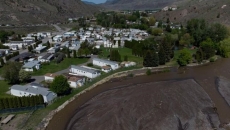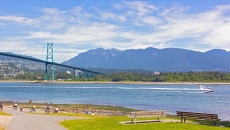As parents and caregivers send their kids and teens back to school, doctors say it's a good time to check if they are up to date on recommended shots after pandemic shutdowns disrupted immunization schedules.
"What happened with COVID basically is that everybody got behind on a lot of preventative options," said Dr. Vivien Brown, a Toronto family doctor and advocate with Immunize Canada.
"They were postponed due to the seriousness of COVID and the public health focus on COVID as opposed to on school-based vaccines."
Public health agencies across the country have been running vaccine catch-up programs, but it's still important for parents to check and ensure their kids are protected against vaccine-preventable illnesses, said Dr. Theresa Tam, Canada's chief public health officer.
"This is a key time point in our calendars to set that reminder to get our routine vaccinations caught up," said Tam.
Immunizations against hepatitis B, meningitis and human papillomavirus (HPV) are generally offered in Canadian schools, although schedules vary between provinces and territories, she said.
Ontario and New Brunswick are the only provinces that require proof of vaccination against measles, mumps and rubella, as well as tetanus, diphtheria, pertussis (whooping cough), polio and chicken pox for children to be allowed to attend school. Otherwise, parents are required to get a medical or religious exemption.
The other provinces and territories strongly recommend those vaccinations but children and teens are allowed to go to school without them.
But if there's an outbreak of any of these illnesses — such as measles — students who aren't immunized will likely have to stay home from school, daycare or other organized activities such as sports to protect them from infection, Tam said.
Such outbreaks can take "several weeks" to resolve, she said, and would further disrupt students' lives.
"These vaccinations are really important not only to protect against very serious bacterial and viral illnesses, they can also reduce impact in terms of school absenteeism," Tam said.
Based on the immunization schedule provided by the Public Health Agency of Canada online, here's a guide for parents and caregivers on what vaccines are recommended at various times as kids progress through school. The timing of each vaccination varies between provinces and territories.
"Often parents overestimate how up to date kids are," said Dr. Cora Constantinescu, a pediatric infectious diseases specialist who runs a vaccine hesitancy clinic at Alberta Children's Hospital.
If you're not sure whether or not your child or teen has received all the vaccines recommended, contact your primary care provider or local public health agency, she said.
BEFORE KINDERGARTEN:
Children should have received multiple doses of the tetanus, diphtheria, pertussis, polio and Haemophilus Influenzae Type B vaccine (DTaP-IPV-Hib) as babies, starting at two months of age. (Hib is a bacterium that can cause infection in young children). In many provinces and territories, infants also get hepatitis B immunization.
Babies also get a measles, mumps and rubella (MMR) vaccine at one year of age. Around this time they're also vaccinated against varicella (chicken pox).
Babies also get a meningococcal vaccination, which protects against a strain of meningitis, usually at 12 months. In Quebec, that vaccination is given at 18 months. In B.C., Yukon and the Northwest Territories, infants receive their first dose of meningococcal vaccine at two months, then again at 12 months. In Alberta they get their first dose at four months, then again at 12 months.
Pneumococcal vaccinations are given starting at two months, as is the rotavirus vaccine.
KINDERGARTEN AND GRADE 1
DTaP: Kids between four and six years of age, depending on the province or territory, often get another dose of tetanus, diphtheria, pertussis and polio vaccine.
MMR and varicella: In B.C., Manitoba, Ontario, and Yukon, kids in the four to six age group also get another shot of MMR and varicella vaccine.
GRADE 4
Meningococcal vaccine: In Newfoundland and Labrador, kids get this vaccine to protect against various strains of meningitis in Grade 4.
HPV: In Quebec, the first dose of HPV vaccine is provided in Grade 4. A second dose is given in secondary school.
GRADE 6 THROUGH SECONDARY SCHOOL
Meningococcal vaccine: In Saskatchewan and Manitoba, kids get their shots in Grade 6. In Ontario and Nova Scotia, it's in Grade 7. In B.C., Alberta, New Brunswick P.E.I., Yukon and Nunavut, students get their meningococcal vaccination in grade 9.
In Quebec, the meningococcal vaccine is given in the third year of secondary school. In N.W.T., kids get it in Grade 12.
Hepatitis B: In Saskatchewan, Manitoba, and Newfoundland and Labrador, students in Grade 6 get a hepatitis B vaccination. In Ontario and Nova Scotia, kids get it in Grade 7. In other provinces and territories, the hepatitis B vaccination should already have been provided in infancy. Kids in Alberta may get the hepatitis B vaccination in Grade 6 as part of a vaccine catch-up program.
Tdap: Kids also need another tetanus, diphtheria and pertussis booster in this age group. In Nunavut, they get it in Grade 6. In New Brunswick, Nova Scotia and N.W.T., kids get this booster in Grade 7. In Saskatchewan, they get it in Grade 8. In Manitoba, they get it in either Grade 8 or 9. In B.C., Alberta, P.E.I., N.L. and Yukon they get the shot in Grade 9. In Ontario, it's between 14 and 16 years of age. And in Quebec, teens get a tetanus and diphtheria booster in the third year of high school.
Human Papillomavirus (HPV): This two-dose vaccine is offered to students in Grade 6 in most provinces and territories. In Ontario, New Brunswick and Nova Scotia it's Grade 7. In Quebec, the first HPV dose is given in Grade 4 and the second is given in the third year of secondary school. In N.W.T. it's two doses given to kids between nine and 14 years of age. The territory offers three doses of HPV vaccine for teens getting their first dose at 15 years or older.
ALL AGES (SIX MONTHS AND OLDER): COVID-19 AND FLU
Unfortunately, it's not only back to school season, but it will soon be respiratory illness season, doctors say.
Last year was an especially brutal season for kids, as a triple whammy of COVID-19, flu and respiratory syncytial virus (RSV) hit, said Constantinescu.
"I have three children and every fellow parent I talked to was just amazed at how sick the kids were," she said.
Parents can help prevent the same thing from happening again by making sure their kids get the flu shot and a COVID-19 booster when they're available in the fall, Constantinescu said.
Routine vaccinations also offer protection during the respiratory season.
There's currently no RSV vaccine in Canada for school-age children.
Children can get the existing COVID-19 vaccine if they haven't had their primary two-dose series yet, Tam said.
Health Canada is reviewing two new mRNA vaccines that specifically target the Omicron variant and recommendations on what age groups should take it are expected this fall, she said.
If your kids need to catch up on some routine immunizations, there are no safety concerns about getting those in addition to COVID-19 and flu vaccinations, the doctors said.
But if parents feel more comfortable spacing them out, they can talk to their health-care provider or public health to come up with a vaccination schedule, Constantinescu said.





